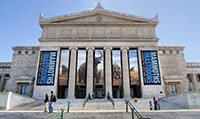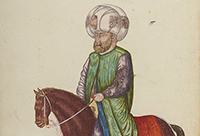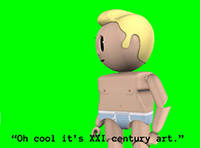Annual 2018-2019 Class Schedule
| Course # | Course Title | Fall | Winter | Spring |
|---|---|---|---|---|
| HUM 260-0-20 | Economics and the Humanities: Understanding Choice in the Past, Present, and Future | Morton Schapiro and Gary Saul Morsen TuTh 12:30 - 1:50 pm | ||
HUM 260-0-20 Economics and the Humanities: Understanding Choice in the Past, Present, and FutureCo-listed with SLAVIC 396. At any given moment, how many alternatives are possible? Is there really such a thing as chance or choice? How does our understanding of the past affect the future? | ||||
| HUM 325-4-20 | Hitchhiking the Atlantic | Andrew Britt TuTh 12:30 - 1:50 pm | ||
HUM 325-4-20 Hitchhiking the AtlanticFulfills Distro 4 (Historical Studies) Co-listed with PORT 396 and HISTORY 392. “Hitchhiking the Atlantic” charts the history of the Atlantic World through the biographies of individuals on the move. Some of these travelers were world historical figures, while others were ordinary, common people nearly forgotten to history. All of them had cross-cultural encounters and made connections that fundamentally altered their own lives and shaped historical processes much larger than themselves. We will focus on Atlantic travelers who effected and reflected historical change relating to three themes: race and American slavery, (anti)colonialism, and industrial capitalism. These themes are not isolated to the past; they continue to unfold in the present, shaping societies across the globe in the twenty-first century. Students will gain an understanding of how disparate histories in Africa, the Americas, and Europe were (and remain) interconnected on multiple scales, from individual to empire. We will examine individuals’ journeys and experiences through autobiographical source material and situate figures in broader contexts through supplementary readings. The class will produce original biographies of Atlantic World travelers and use a digital mapping application to trace their movements. No prior experience with digital mapping is necessary, and students interested in learning programming basics in a supportive and structured environment are welcome. | ||||
| HUM 325-4-20 | Bulldozed: São Paulo and Chicago | Andrew Britt TuTh 2:00 - 3:20pm | ||
HUM 325-4-20 Bulldozed: São Paulo and ChicagoFulfills Distro 4 (Historical Studies) Co-listed with PORT 396-0-1 and HISTORY 392-0-28. What stories does rubble tell? | ||||
| HUM 325-6-20 | Ancient Rome in Chicago | Francesca Tataranni MW M 3:00 - 4:50 pm; W 3:00 - 4:20 pm | ||
HUM 325-6-20 Ancient Rome in Chicago
Fulfills Distro 6 (Literature and Fine Arts) Ancient Rome is visible in Chicago — walk the city and learn to "read" the streets, buildings, and monuments that showcase Chicago's engagement with the classical past! You'll gain digital mapping and video editing skills as you collaborate on a virtual walking tour mapping Chicago's ongoing dialogue with antiquity. With a combination of experiential learning and rigorous research methodologies, you'll explore architecture, history, visual arts, and urban topography in this quintessential modern American city. | ||||
| HUM 325-6-22 | GIFs, Selfies, Memes: New Networked Genres | James Hodge TuTh 9:30 - 10:50 am | ||
HUM 325-6-22 GIFs, Selfies, Memes: New Networked GenresFulfills Distro 6 (Literature and Fine Arts) Co-listed with ENGL 385-20. This course examines the varieties of audio/visual discourse native to and sustained by always-on computing—the technologies, habits, forms, and cultures emerging alongside smartphones, social media, and pervasive wireless networks in the mid-2000s. Topics may include animated GIFs, memes, selfies, supercuts, podcasts, search engines, vaporwave, ASMR videos, etc. While "sharing" and "connection" typically rule discussions of what networks do or enable, our aim will be to analyze how web-based genres promote affects that diverge from popular accounts but nonetheless constitute much of networked life, e.g. boredom, anxiety, ambivalence, and cuteness but also new idiomatic expressions of LULZ, facepalming, dead, A E S T H E T I C, etc. We will proceed by pairing readings in new media studies alongside artworks. Readings by Ngai, Cohen, Scheible, Nakamura, Andrejevic, Browne, Shifman, Phillips, Cheney-Lippold, Richmond, and others. Artworks to be analyzed may include GIF works by Faith Holland, Dennis Cooper, and Lorna Mills; selfie projects by Vivian Fu and Mary Bond; supercuts by Benjamin Grosser and Jonathan Harris; and much else by Erica Scourti, Thomson and Craighead, Kevin Lee, David OReilly, and others. | ||||
| HUM 370-3-20 | Heterosexualities: Past, Present, Future | Héctor Carrillo TuTh 9:30 - 10:50am | ||
HUM 370-3-20 Heterosexualities: Past, Present, FutureFulfills Distro 3 (Social and Behavioral Sciences) Co-listed with GNDR_ST 331-0-20 and SOCIOL 376-0-22. How and when did the identities that we know today as “straight” or “heterosexual” come into existence? And how have those identities differed across time and space? Drawing on the academic literature, literary pieces, and representations in film and other popular media, we will examine the “invention of heterosexuality” and its transformation and diversification over the course of the 20th and 21st centuries. By paying attention to multiple definitions of heterosexuality—including those that coexist within a single historical moment and location—we will problematize the notion that heterosexuality can be simply conceived as a single, unitary sexual identity. Among other topics, we will discuss the increasingly blurring boundaries between heterosexuality and other sexual identities; heteroflexibility, sexual fluidity, and other challenges to conventional definitions of heterosexuality; the power associated with heterosexuality, masculinity, and femininity; the effects of sexual inequality; contemporary problems and issues, including hookup culture and definitions of sexual consent; and imagined futures of the notions of sexual identity and sexual orientation. | ||||
| HUM 370-4-20 | Varieties of Racial Thought | Jonathon Glassman MW 11:00am - 12:20pm | ||
HUM 370-4-20 Varieties of Racial ThoughtFulfills Distro 4 (Historical Studies) Co-listed with HISTORY 300-0-28. It is now widely understood that racial boundaries are not biological phenomena but are the products of social and historical processes. And yet, despite the demise of racial science in the final decades of the twentieth century, racism and the belief in racial difference persist. We will approach the roots of this conundrum by examining the diverse manifestations racial thought has assumed in a variety of historical and global settings. Topics will include the rise of Western racial thought and the idea of whiteness; the links between concepts of progress, civilization, and racial difference; antisemitism and the Aryan myth; genocide and the Hamitic myth in central Africa; race, medicine, and the abuse of genetic science in the twenty-first century. | ||||
| HUM 370-5-20 | What is Obscenity? | Erica Weitzman TuTh 11:00am - 12:20pm | ||
HUM 370-5-20 What is Obscenity?Fulfills Distro 5 (Ethics and Values) Co-listed with GERMAN 326-0-20 and COMP_LIT 383-0-21. “I know it when I see it”: at least since U.S. Supreme Court Justice Potter Stewart’s infamous statement on obscenity in the 1964 case Jacobellis v. Ohio, obscenity has been an ambiguous, not to say, an undefinable concept. And yet, from movie ratings and parental controls to banned books and images to “vulgar remarks,” we are constantly surrounded by ideas about what can and cannot be shown, what is and is not appropriate for the eyes and ears of this or that population. But what is obscenity, exactly? What do we mean when we call something “obscene,” or remove it on grounds of its obscenity from public consumption? Are obscene images the same thing as immoral acts, and if not, what does the act of representing something add or take away from the thing represented? Finally, does the concept of “obscenity” even mean anything any more in an era of shock art and internet porn, of free speech and “grab ‘em by the pussy,” an era in which, supposedly, “nothing is shocking”? This course will examine the topic of obscenity from a variety of angles, including questions of law, governance, and public morality; sexuality and psychoanalysis; affect theory; visual culture; phenomenology; art history; and literary and media studies. We will seek to go beyond the discussion of particular case studies and look at the big-picture history and cultural assumptions that underlie the idea of “obscenity” in all its forms. | ||||
| HUM 370-5-20 Islamic Law | Islamic Law | Brannon Ingram MW 2:00 - 3:20 pm | ||
HUM 370-5-20 Islamic Law Islamic Law
Co-listed with REL 351 and MENA 390 | ||||
| HUM 370-6-20 | New Media Art | Jim Hodge MW 11:00 am - 12:20 pm | ||
HUM 370-6-20 New Media Art
Co-listed with ART HISTORY 369-0. | ||||
| HUM 370-6-20 | The Crime Centered Documentary | Debra Tolchinsky TuTh 12:30 - 1:50 pm | ||
HUM 370-6-20 The Crime Centered DocumentaryFulfills Distro 6 (Literature and Fine Arts) Co-listed with LEGAL_ST 376 and RTVF 379-0. In this course, we will view non-fiction and hybrid films that revolve around crime, criminal justice, and criminal court cases. Our emphasis will be on cases that are either mired in controversy and/or emblematic of wider social concerns. Readings will accompany viewings and experts will weigh in with legal, philosophical or scientific perspectives: What is accurately depicted? What is omitted? What is misrepresented? Concurrently, we will investigate the films aesthetically: How is the film structured and why? What choices are being made by the filmmaker in terms of camera, sound and editing and how do these choices affect viewers? Throughout the course, we will consider the ethics of depicting real people and traumatic events. We will also look at specific films in regard to their legal or societal impact. Assignments will include a series of short response papers and a final project, which can take the form of either (up to the student) a final 12-15 page paper or an 8-12 minute film. The final should center upon a legal topic. Ideas include, but are not limited to: A comparison of two films depicting the same criminal case, a polished/edited interview with a person somehow connected to a crime, an investigation of a local court or legal advocacy center. Group projects (two people max) will be allowed. | ||||
| Hum 370-6-21 | Black Ecology | Rebecca Zorach Th 2:00 - 4:50pm | ||
Hum 370-6-21 Black EcologyCo-listed with ART_HIST 369-0-01 and ENVR_POL 390-0-23. Taking inspiration from Nathan Hare’s 1970 essay “Black Ecology” and Félix Guattari’s 1989 essay “The Three Ecologies” (which discusses ecology in relation to environment, society, and human consciousness and also includes a memorable comparison of Donald Trump to invasive algae), this course addresses the question of eco-aesthetics in relation to environmental justice with a focus on the experiences, political struggle, and art making of people of color in the U.S. and internationally. We will read fiction and scholarly writings, view artworks, and participate in one or more environmental projects. The class will also host several guest speakers (artists, scholars, and activists). It will also involve several field trips during class time—potentially extending into the early evening—and/or on weekends. | ||||
| HUM 370-6-21 | The Craft of Environmental Nonfiction | Sarah Dimick TuTh 2:00 - 3:20 pm | ||
HUM 370-6-21 The Craft of Environmental NonfictionFulfills Distro 6 (Literature and Fine Arts) Co-listed with ENGL 308; also approved for credit in the Science in Human Culture major/minor. This course approaches environmental nonfiction as a literary craft. Examining environmental essays, pieces of scientific journalism, memoirs, travelogues, op-eds, and speculative portrayals of the environmental future, we will identify the literary techniques writers use to portray the microscopic, the global, the invisible, the extinct, the beautiful, and the uncertain. In lieu of traditional papers or exams, students will produce their own environmental nonfiction, allowing us to explore environmental nonfiction not only as readers but also as practitioners. Student writing will be workshopped each week to encourage students to hone their voices and expand their narrative strategies. | ||||
| HUM 370-6-22 | Postcolonial Noir | Rebecca Johnson MW 11:00 am - 12:20 pm | ||
HUM 370-6-22 Postcolonial NoirCo-listed with ENGLISH 313-0-20 and MENA 390. Crime fiction is where questions of law, justice, and community are investigated, but only rarely resolved. This course will explore this problem in a transnational context, so as to expose the fundamental issues of power and difference that have underlain the genre from its very beginning. We will start with the imperial foundations of Sherlock Holmes' investigations, and then work our way through texts produced in colonial and postcolonial settings including in colonial India, post-independence Algeria, and contemporary Egypt. Surveying over 150 years of detection, we will use these texts to understand the relationship between criminal investigation and literary interpretation, between history and the present, and between literary style and political authority. | ||||
| HUM 370-6-22 | Shakespeare and Early Modern Race Studies | Peter Erickson TuTh 9:30 - 10:50am | ||
HUM 370-6-22 Shakespeare and Early Modern Race StudiesCo-listed with AF_AM_ST 380-0-21. This course will focus on close reading of five plays with a view to analyzing Shakespeare’s dramatic and verbal expressions of race. We will explore the representations of black figures. But we will also pursue racial whiteness and the enactment of interrelations and conflicts between black and white characters. Special emphasis will be placed on how the impact and outcome of Shakespeare’s endings are constructed in each play. What happens if we are left at the end with problems instead of solutions? How do we address this complexity? | ||||
| HUM 395-0-20 | Race/Gender/Sex and Science: Making Identities and Differences | Steven Epstein TuTh 3:30 - 4:50pm | ||
HUM 395-0-20 Race/Gender/Sex and Science: Making Identities and Differences
In this seminar, we will focus on the interplay between science, technology, and medicine, on the one hand, and race, gender, and sexuality, on the other. Taking up a series of controversies from the recent past and the present, we will consider the implications of developments in the life sciences for politics, social identity, and cultural belonging. In our readings and discussions, we will consider the roles of science, technology, and medicine in redefining race, gender, and sexuality; the ways in which cultural beliefs about race, gender, and sexuality have influenced scientific research and the development of knowledge and medical practice; and the efforts by individuals and social movements to challenge scientific institutions and assert new claims about identity, difference, and inequality. | ||||
| HUM 395-0-20 | Grad Seminar: The Anthropocene and The Environmental Humanities | Lydia Barnett Thursdays 3:00 - 5:50pm | ||
HUM 395-0-20 Grad Seminar: The Anthropocene and The Environmental HumanitiesNote: This is a GRADUATE SEMINAR! The concept of 'the Anthropocene' has sparked tremendous interest across the natural sciences, social sciences, and humanities, forging trans-disciplinary connections and sparking disciplinary debates as few other topics in recent scholarship have. The aim of this graduate seminar is twofold: to survey the richly interdisciplinary literature on the Anthropocene from the last two decades and to consider how humanists in particular (including practitioners of the qualitative social sciences) have intervened in these conversations. How have the environmental humanities adopted, challenged, and contributed to evolving understandings of the relationship between humanity and the global environment? What kinds of interventions are humanistically-oriented scholars uniquely able to make to environmental scholarship and activism? | ||||
| HUM 397 | Exhibiting Antiquity: The Culture and Politics of Display | Ann Gunter TTh 2 - 3:20 pm | ||
HUM 397 Exhibiting Antiquity: The Culture and Politics of Display | ||||


 Fulfills Distro 6 (Literature and Fine Arts)
Fulfills Distro 6 (Literature and Fine Arts) Fulfills Distro 3 (Social and Behavioral Sciences) or Distro 5 (Ethics and Values).
Fulfills Distro 3 (Social and Behavioral Sciences) or Distro 5 (Ethics and Values).